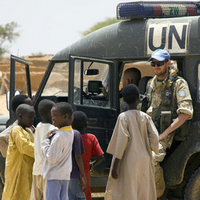 The starting premise intrigues:
The starting premise intrigues:
A subtle evolution of United Nations peacekeeping operations is underway. If the first of these missions kept an agreed-upon peace, and later missions sought to make peace, several countries now use these operations to advance their foreign and economic policy agendas, and raise their global profile. This shift, selective as it is to date, may potentially raise the standard of conduct in U.N. peacekeeping operations increasingly fraught with charges of criminal behavior, corruption, lack of accountability, and general ineffectiveness. However, there are significant downsides to this approach.
China, Brazil and India are thereupon presented for being "well-positioned to leverage this new facet of peacekeeping."
Some cool background precedes the country analyses, to include the factoid that, "Since 2001, more than half of all U.N. peacekeeping forces have come from seven countries: Pakistan, Bangladesh, India, Nigeria, Jordan, Nepal and Ghana." Body-intensive operations, occurring at heightened frequency, means the UN ends up turning to cheaper militaries--in every sense--that are rich in numbers.
Africa, we are told, is China's primary target for public diplomacy through peacekeeping. I myself have been surprised, whenever I met with Chinese military officers, how many of them have done time on the continent. It is really viewed as a prime operational experience. True to form, the Chinese provide purely SysAdmin troops (docs, police, observers, engineers) and no combat-capable personnel. China explicitly explains its expanding role as filling the vacuum created by the decline of Western military participation in such peacekeeping ops.
As natural as the day is long to me. You go with the frontier integrators of the age--not last century's version.
Brazil is presented as seeking more peacekeeping roles as part of its long campaign to win a permanent seat in the UN Security Council, although the geographic purview of its participation remains tight on LATAM.
India, a long-time supplier of peacekeepers, is presented as lacking the tight strategic focus of China--as in, it's not yet sure what it wants to become as a great power.
Conclusion: mostly upside for the UN with some danger that rising great powers will pick only their preferred missions.
Smart piece.